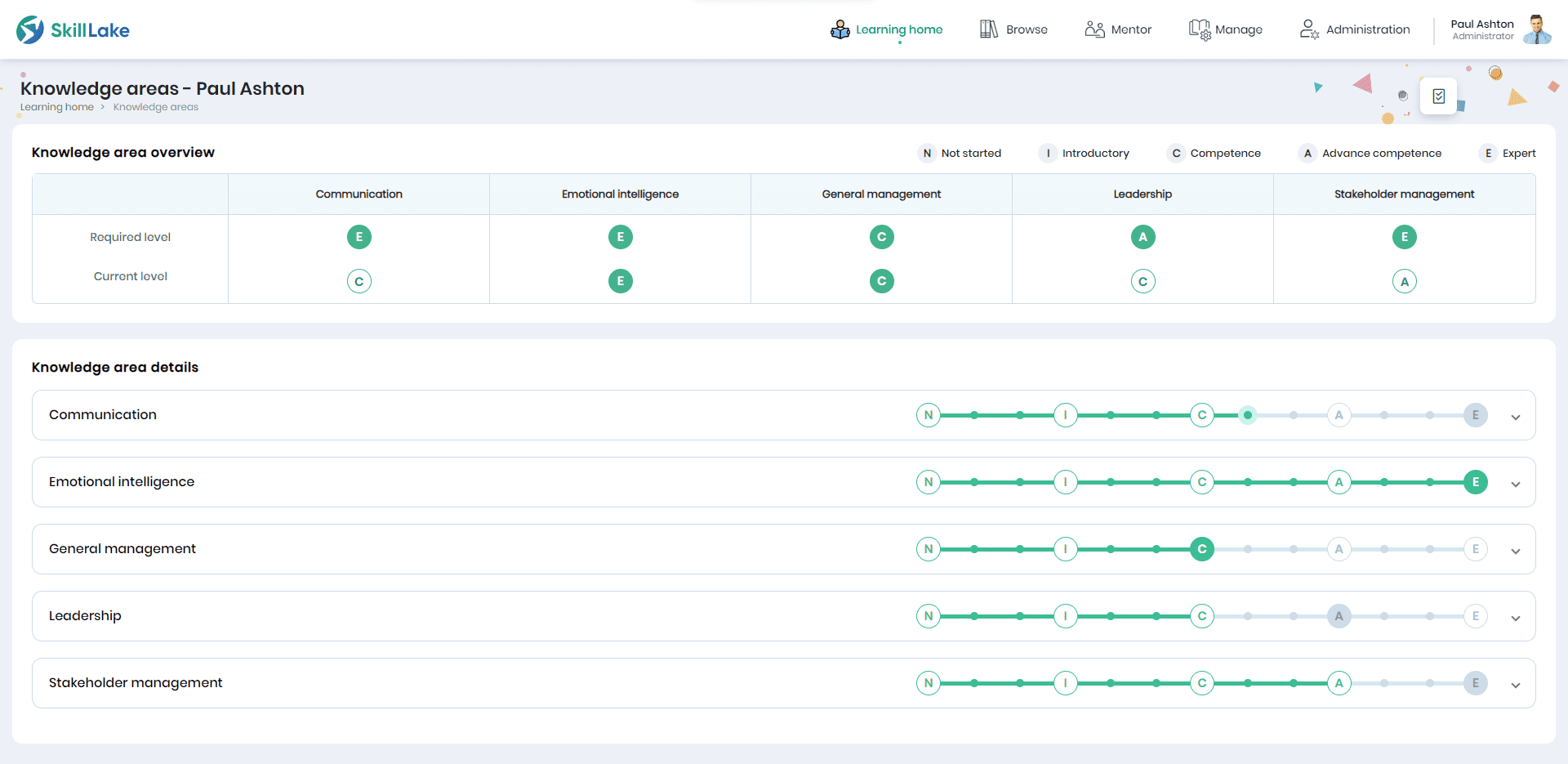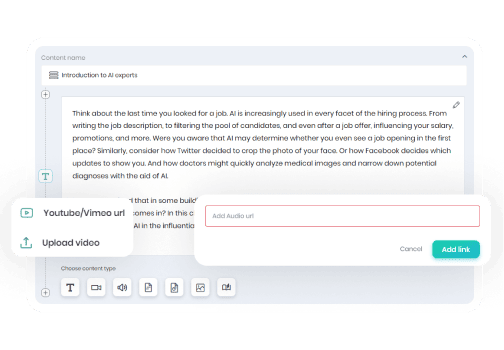AI Takes Center Stage: Personalizing Learning with AI-Powered LXP

The persistent challenge for organizations lies in addressing the ever-widening skill gap. Recent surveys indicate that 87% of HR executives have acknowledged or anticipated primary skills gaps within their workforce. This statistic has prompted a paradigm shift in how businesses approach talent development and upskilling. AI-powered LXP is the dynamic solution reshaping how organizations bridge these skill gaps. Surveys unveil that 89% of business leaders recognize the need for a skill-based approach to redefine how work is conceptualized, talent is deployed, and careers are managed.
This revolutionary transition nurtures creativity and efficiency, establishing the groundwork for a more flexible and responsive workforce. According to insightful reports, businesses leveraging AI are projected to witness a remarkable 40% increase in profitability by 2035. This underscores AI-powered Learning Platforms‘ role in enabling organizations to adapt seamlessly to the demands of the digital, remote, and mobile work landscape.
In this blog post, we will explore the transformative impact of AI and Machine Learning on Learning Experience Platforms (LXPs) and their role in shaping the future of workforce upskilling.
How Is AI And Machine Learning Transforming LXP?
AI and Machine Learning are revolutionizing Learning Experience Platforms (LXPs) in several ways, particularly in the realm of personalized learning:
1. Tailored Learning Paths
AI Learning Platforms are reshaping traditional one-size-fits-all learning paths by crafting personalized journeys for individual users. By analyzing user data and incorporating preferences, past achievements, and learning goals, artificial intelligence generates personalized recommendations for courses and materials that closely align with each individual’s specific needs and objectives. This customized approach enhances user engagement and ensures relevance, leading to more effective educational results or achievements. Moreover, integrating AI in LXPs goes beyond personalization, addressing the importance of adaptive learning for optimal progression. By identifying and adapting to the distinctive learning needs of each individual, AI in LXPs dynamically adjusts content difficulty, pacing, and format based on individual progress and comprehension. This personalized and adaptive methodology challenges learners at an appropriate level, fostering better understanding and retention of concepts.

2. Personalized Assessments
AI-driven LXPs surpass traditional assessments with interactive quizzes, simulations, and natural language processing for easy evaluations. Learners receive detailed feedback, enhancing their understanding of strengths and areas for improvement. Well-crafted questions will guide learning, pinpointing gaps for targeted improvement. It also offers personalized feedback, providing in-depth insights into learner progress, strengths, and weaknesses. This information aids in identifying areas needing attention and tracking overall growth.

3. Intelligent Recommendations
In the face of an overwhelming online information landscape, AI-powered learning platforms tackle the challenge by intelligently recommending content. Through analysis of user behavior, preferences, and performance, these platforms suggest the most relevant and valuable resources from a vast library. This saves time and ensures learners access to accurate and up-to-date information, elevating the learning experience. Based on user data and insights from other learners, predictive analysis and recommendations further guide individuals to explore areas beyond their preferences.
4. Adaptive Content Delivery
AI-driven LXPs dynamically tailor content delivery to each learner’s needs. This adaptive feature utilizes advanced algorithms and data analytics to analyze user behavior, learning patterns, and performance metrics. The platform fosters engagement by recommending relevant content, adjusting difficulty levels, suggesting customized learning paths, accelerating learning outcomes, and maximizing effectiveness. This approach enhances knowledge retention and overall learner satisfaction.
5. Collaborative Learning
AI-driven LXPs enable collaborative learning via features such as discussion forums and chatbots, promoting meaningful engagement among learners. This social learning dynamic encourages knowledge sharing, diverse perspectives, and collaborative problem-solving. AI-powered LXPs can integrate collaborative projects, fostering teamwork, critical thinking, and real-world problem-solving. These projects also offer opportunities for peer feedback and constructive learning interactions, enhancing the collective learning experience.
6. Data-driven Insights
AI-driven LXPs collect detailed data on learner behaviors, performance, and engagement, providing comprehensive analytics dashboards for individual and group progress insights. These data-driven analyses empower learners to recognize their patterns, pinpoint areas for improvement, and make informed decisions about their learning journey.
AI algorithms leverage learner data to offer personalized recommendations, suggesting relevant courses, resources, and potential career paths based on preferences and aspirations. These intelligent suggestions keep learners on the right track toward achieving their goals.
7. Continuous Learning and Adaptability
AI-powered LXPs undergo continuous improvement with regular updates and enhancements based on user feedback and performance data. This ensures learners access the latest content, methodologies, and features, elevating their learning experience.
At the forefront of innovation, AI-powered LXPs integrate emerging technologies like virtual reality (VR), augmented reality (AR), and gamification for enhanced learner engagement and immersion. These technologies offer interactive and enjoyable learning experiences, contributing to greater effectiveness.
8. Multiple Content Formats
Incorporating diverse format types in a Learning Experience Platform (LXP) is pivotal for delivering an immersive and adaptable learning experience. By offering a range of formats such as text, videos, interactive modules, quizzes, and multimedia presentations, an LXP addresses varied learning preferences and heightens learner engagement. This approach allows learners to absorb information through visual, auditory, and interactive channels, catering to individual learning styles.

Furthermore, the utilization of different formats is beneficial not only for learners but also for search engine recognition. Search engines value diverse content formats as they enhance user experience and contribute to improved search rankings. Including multiple format types in an LXP nurtures a comprehensive and well-rounded learning environment and enhances organic visibility by attracting search engine traffic.
Conclusion
AI-driven Learning Experience Platforms are transforming training by providing personalized learning, dynamic content distribution, intelligent reviews, social learning, data-driven insights, smart suggestions, and flexibility.
Learn how AI-enabled Skill Lake LMS helps drive better results in training management. Request a Free Demo now!
Build a culture of continuous learning with Skill Lake’s state-of-the-art people development platform. Give your employees professional training to help them excel in their job roles and propel your business to greater efficiency and success.
Start Today

Sachin Krishna
Sachin is a passionate advocate of e-learning with a profound knowledge of the field. He regularly writes compelling content that captivates readers and works to spread awareness of learning solutions.